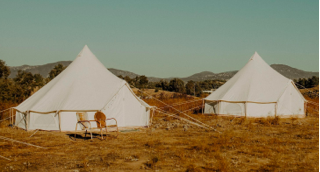Menu
-
- Shop
- Glamping Tents
- Wall Tents
- Canvas Tent
- Bell Tents
- Festival Tents
- Hunting Tents
- Yurt Tents
- Family Tents
- Stargazing Tent
- Cabin Tents
- Camping Gifts
- Overland Tents
- Tent Stoves
- 4 Person Tents
- 6 Person Tents
- 8 Person Tents
- 12 Person Tents
- Canvas Bags
- Camp Gears
- Camping Chairs
- Shade Canopy Tents
- Camping Fans
- Resources
- About
- Contact Us
- Reviews
-
- Login

Free Shipping

Pay No Sales Tax
30-Month Warranty
Tents
Shop


The LiT List
Glamping & Camping Ideas + Resources
The History of Canvas Camping Tents
4 min read
Canvas tents have been around for quite some time. It’s safe to say that our nomadic ancestors probably swapped out their animal pelt tipis and shelters for canvas no sooner than the fabric was invented. So the history of canvas tents goes way, way back. But what do we know for sure about their documented history?
Here is a quick look at the history of canvas tents, from their practical use in military operations to their newfound role, appreciation, and place in today’s day and age.
The Origin of Canvas and Canvas Tents

Canvas has a fascinating history of its own. The word “canvas” derives from the Latin “cannabis” or “hemp,” which was the fiber most commonly used in 3,000 B.C. This heavy waxed canvas, originally made for maritime purposes including a ship's sails, eventually became used as more than sailcloth, and evolved into a multi-purpose fabric used for architectural purposes and, you guessed, tents!
The waxed canvas, obviously waterproof for seafaring, reached military encampments and was used as temporary shelters. Knights and soldiers used canvas tents during the medieval period and explorers took up canvas tents as they trekked the globe during the Renaissance. Waxed canvas even became a highly used fabric by the British Armed Forces, applied to everything from canvas tents to waterproof uniforms and duffel bags. The canvas material of these tents was able to withstand harsh conditions, just as they still do.
Canvas is a fabric hailed for its endurance, durability, and so much more. It’s easy to see why canvas tents have created such as legacy.
Canvas Tent Styles: Staked in History

Canvas tents come in many different styles, each with its own unique history.
One canvas tent style that many recognize is the attractively shaped canvas bell tent. This bell-shaped canvas tent is most inspired by the Sibley Bell Tent, which has its own rich history. Canvas Sibley Bell Tents were invented in 1856 by Henry Hopkins Sibley, a US Army Colonel stationed on the Texas frontier, who tweaked the practical design borrowed from Native American tipis. Eventually, this canvas tent style was used for military expeditions during the westward expansion, as well as frontier exploration.
Another style of canvas tent is the A-frame pup tent. This basic triangle tent with sloped walls, along with larger-sized wall tents, was primarily used for military operations. Both the Union and Confederate armies of the American Civil War used wall-style canvas tents for their encampments. Even through WWI and even into the 1970s, the F1 tent and pup tent were used.
Later, these canvas tents were picked up by the Girl Scouts and Boy Scouts of America and repurposed from army surplus stores to outfit their excursions. After all, Robert Baden-Power, founder of the Scout Movement, was a military man himself.
The Modern Era of Canvas Tents & Glamping

Today, canvas tents have taken hold in the glamping trend and outdoor hospitality. The history of glamping with canvas tents, or luxury camping, has actually been around for quite some time (even if the term was only coined recently), dating as far back as the summit meetings between King Henry VIII of England and King Francis I of France.
After WWII, however, things began to change. Ideological shifts like the Golden Age of Camping thanks to conservation movements along with advances like affordable automobiles, average folks and families grew a different kind of appreciation for canvas tents, heading out on leisurely camping trips and recreational safari expeditions. No longer were canvas tents used solely for survival or military purposes. Camping became fun.
Some of those modern advances also made canvas tents more durable, creating a longer-lasting canvas that can withstand mold and mildew far better than their predecessors, as well as offering a lighter canvas material to make transportation easier.
Beyond Camping: Weddings, Festivals, and Outdoor Hospitality
Canvas tents are made for camping or glamping, sure. Even now, hunters still use them as hunting shelters for deer camps and overlanders pitch canvas tents on top of vehicles or the ground along their journey. But their durable nature and beauty have also recently played a large role in the hospitality industry, especially for events and travel.
Today, individuals can grab canvas tents for music festival camping, complete with modern features like zippered PVC groundsheets for cleaning up mud, sand, and whatever company tracks inside. Or homeowners can create a spare multi-purpose space like a yoga room or to host backyard slumber parties for kids or offer extra sleeping quarters for overnight guests. And you don’t have to look far to find spacious, luxurious glamping accommodations and outdoor venues to gather together for family reunions, rustic or bohemian weddings, and more.
Canvas Tent History: Building on Top of the Legacy
Whether you consider yourself a purist and use canvas bell tents during historical reenactments, as a practical durable structure for hunting trips, or are enjoying glamping and unplugging in nature for the first time ever, canvas tents don’t get any more classic.
How do you plan to build on the legacy and make history with your canvas tent?
Related Resources

THE LIT LIST 4 min read
Can Glamping Businesses Survive a Recession?
Examining the Resilience of Luxury Camping Businesses Glamping, the luxurious cousin of traditional
THE LIT LIST 5 min read
Duffel Bag vs. Suitcase: Which is Right For You?
Headed on a trip? Not sure if you should pack a duffel bag or a suitcase? The choice might seem diffDuffel bag vs. suitcase: Compare the pros and cons of each to decide the ideal travel companion for you.
Popular Blogs
Camping Gift Ideas for People Who Have Everything
The Best Portable Tent Heaters - Ways To Heat A Canvas Tent
Glamping in Northern California: 8 Luxury Sites
Waterproofing A Canvas Tent - Retreating Canvas
33 Camping Quotes to Inspire Your Next Adventure
What Is Glamping? Origins, Definition, Destinations & More
10 Tips for Staying Warm While Winter Camping
How to Maintain and Clean a Bell Tent
Essential Family Camping Checklist: What to Pack [PRINTABLE]
Backyard Glamping Checklist for an Unforgettable DIY Glampsite
Popular Products
Subscribe
Sign up to get the latest on sales, new releases and tips
BECOME AN INSIDER
We’ll periodically share inspiration, bell tent releases, special offers, and event notifications with ya.


